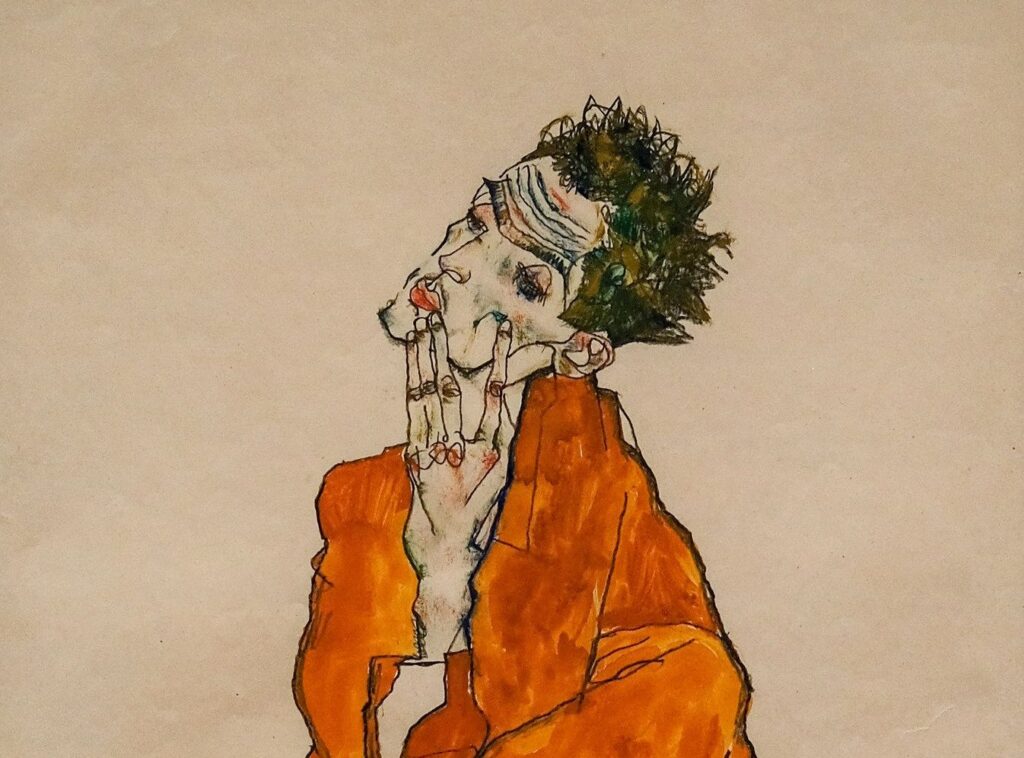[ad_1]
Ulrich is a serial womaniser whose relation to women is analogous to, and therefore gives us insight into, his relation to ideas. Early in the novel he describes an evening with one of his lovers using two images: the first is a “ripped-out page” from a book. The evening, although enjoyable, didn’t connect to any larger narrative. Ulrich was not looking for a wife, or to start a family; he just likes being around them, until he doesn’t — and this means that his romantic evenings fail to add up, like a series of vacations. The second image, even more striking, is that of a tableau vivant: a frozen drama, where actors pose motionless to recreate a famous scene. Imagine, for example, an actress playing the role of Medea standing over her children with a knife. Musil describes such a moment as “full of inner meaning, sharply outlined, and yet, in sum, making absolutely no sense at all”. The tableau vivant makes no sense because you would never hold a knife like that, still, poised, hovering over someone: that position only makes sense in the context of other positions, into which it is integrated as a motion. This is an apt description of what happens when ideas are forced to do the work to which they would only be suited if you did not remove any possibility of ever “wholly encompassing some subject matter”. When you chop human love, or human thought, into pieces, the effect is similar to chopping a human body into pieces: horrifying.
“I was afraid that if I looked carefully, I would discover that there really were no answers out there.”
Musil fought in the First World War; during the Second World War, the Nazis banned his books and he lived in exile with his Jewish wife in Switzerland. He died in 1942, leaving The Man Without Qualities, which he had been obsessively revising for decades, unfinished. It is a remarkable fact about the novel that Ulrich, Musil’s alter ego, sets foot in neither war. The novel opens in August 1913, and in over a thousand pages it never manages to traverse the 11 months to the start of the First World War. Musil knew something of the atrocities of dehumanised modern warfare and the brutality of totalitarian oppression, but they were not his subject matter. Instead, he wanted to report, firsthand, on what he had seen earlier, back when times were supposedly good, a realisation so disturbing that not even two subsequent world wars could distract him from it: “there is just something missing in everything.” In bad times, short-term goals crowd your field of view; it is precisely when times are good that you are in a position to take a step back and notice that the big, long-term goal, the one that is supposed to hold everything together, is what has gone missing.
I read The Man Without Qualities for the first time when I was in graduate school in Classics, and within a year, I had left that programme and switched to philosophy. Why, given that I had been devouring philosophical texts since high school, didn’t I major in it in college, or pursue it after college? I don’t think I could have put it this way at the time, but: I was afraid. The fear was partly an insecurity about myself — that I wouldn’t measure up, that I had nothing to contribute, that I was not worthy to walk the esteemed corridors of philosophy — but the other part, the deeper part, was a fear about philosophy. I was afraid that if I looked carefully, I would discover that there really were no answers out there. As long as I never tried to find the right way to live, I couldn’t definitively say it didn’t exist. I’m not claiming that Musil reassured me that it did. No, what The Man Without Qualities gave me was a vivid and terrifying glimpse of the life of thoughtful observations; Musil was my ghost of Christmas future. I would have to, somehow, find in myself the resources to believe that inquiry was possible, both for human beings in general, and for me in particular, because, as scary as the prospect of failure was, I had just seen something scarier.
You could think of a mind as having a dial that is usually turned way down, except on those occasions when we need to solve a specific problem, but even then, we only turn it up a little. What would happen if you set it to maximum, all the time? It would chew through everything — through our usual self-justifications, through the conceit of inevitability that attaches to our habits and customs, through the thin scaffolding of reason that holds life together. Such a mind would become, as Ulrich once describes himself, “a machine for the relentless devaluation of life”. The only way to avoid this result is to give the mind a task worthy of its powers, by presenting it with the sorts of questions one can, without shyness, think hard about. But that entails some hope of arriving at answers. This is one way to think about philosophy: a safe space for the unfettered operation of mind.
[ad_2]
Source link

